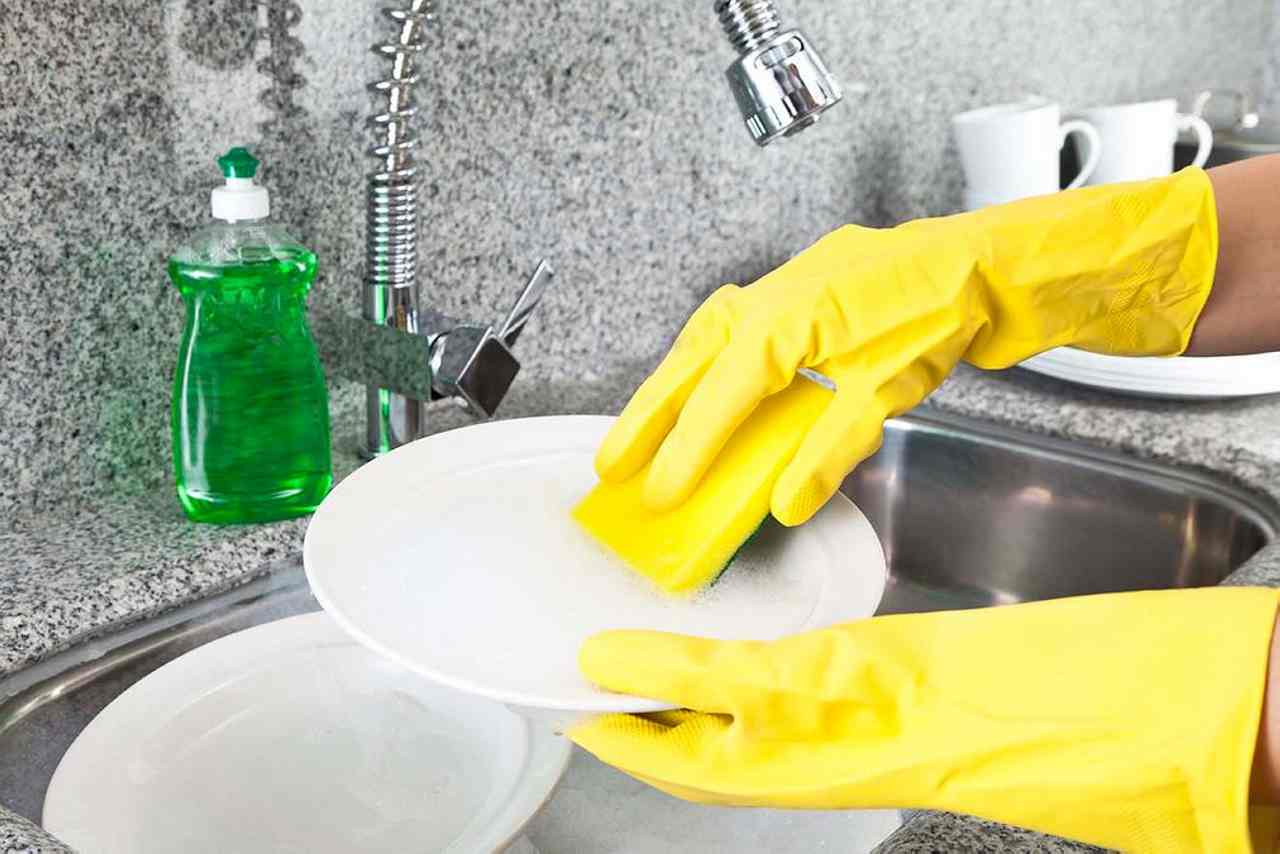Customers in america will spend practically $3.7 million on dishwashing detergents in 2018 to get their dishes clear. That is loads of suds and a whopping statistic that begs the query: Do we actually want dishwashing cleaning soap to get our dishes clear?
The quick reply is: No, we will get alongside with out it.
So what does it take to take away all of the grease and meals particles and kill the pathogens which can be left behind on our dishes and cookware after a luxurious meal?
Frequent sense tells us that water performs a serious function within the course of. Thermal sanitizing utilizing scorching water is an efficient and time-tested methodology to take away particles and kill a broad vary of harmful micro organism. A whole lot of what we eat can merely be rinsed away with extremely popular water. Carbohydrates like sugars and starches are water-soluble, and all that is required to scrub them off dishes is scorching water. So in case you solely eat carbs and emulsified fat you may clear your dishes with scorching water and a bit of elbow grease.
Animal fat and proteins, nonetheless, aren’t water-soluble and wish an alkali to interrupt them down. So, in case you’re out of dish cleaning soap and have a greasy pan to scrub you will must make your individual cleaning soap by including an alkali like baking soda (sure, that stuff within the yellow field) or ashes from, say, your hearth, wood-burning range or out of doors fireplace pit to steaming scorching water and scrub your pan clear. Whereas the trendy comfort of dishwashing detergent could win the age-old battle between oil and water for many of us more often than not, fortunately in case you’re a hobo, a camper or a homesteader, potash and soda ash are available within the stays of your campfire. Whereas wooden ashes and an improvised grass or shrub scrubber could not win the nice housekeeping seal of approval, they will clear your pan and get it prepared for rinsing and sanitizing in boiling water and, lastly, air drying.
Holding in thoughts that dishwashing cleaning soap as we all know it has solely been round because the center of the twentieth century, it is fascinating to notice that folks all through the ages used all types of bizarre issues discovered within the pure world round them – sand, animal fat, ash, alkaline salts, cuttlefish bone, crops like horsetail, mare’s tail and soapwort, hay blended with ash, baking soda, maple sap particles referred to as sugar sand, together with that main element – scorching or operating water – to scour and clear their dishes.
So whether or not you end up right down to the final drop at dwelling, forgot to carry it alongside in your tenting journey or simply need to attempt an eco-friendly, off-the-grid different to performing the age-old chore of washing dishes, here is a fast old-school how-to for contemporary occasions:
Contents
- Baking Soda and Vinegar
- Vinegar
- Chlorine Bleach
- Campfire Ashes
Baking Soda and Vinegar
Do not let the dishes sit – clear and scrape them promptly after your meal. Make certain and sterilize something that got here into contact with uncooked meat in boiling water for five to 10 minutes. Add 1 tablespoon of baking soda to a gallon (3.785 liters) of extremely popular water. And in a separate container add 1 tablespoon of white vinegar to a gallon of extremely popular water. Wash dishes in baking soda water and rinse within the vinegar water. Rinse once more in clear, operating water and permit dishes to air dry.
Vinegar
You can even run your dishwasher with out detergent utilizing solely the rinse cycle. Merely scrape and prerinse your dishes totally by hand and cargo as regular. Add white vinegar to the detergent cup and a rinsing resolution to the rinsing cup. The acid within the white vinegar will disinfect the dishes and the rinsing assist will preserve them from recognizing. Set your dishwasher on the rinse cycle and voila: clear, disinfected dishes – and also you’re conserving water too.
Chlorine Bleach
Take away stuck-on meals and let dishes soak 10-20 minutes in scorching water. Fill a gallon, or 3.785 liter, bucket with COOL water (scorching water will inhibit bleach from sanitizing successfully) and add 1 tablespoon of unscented chlorine bleach. Soak dishes for 1 minute per dish. Soak dishes that got here into contact with uncooked meat longer. Rinse in clear water and let air dry.
Campfire Ashes
Collect some wooden ashes out of your campfire (solely the ashes, no sticks or different particles) and put them in a pot. In a separate pot boil some water. In the meantime, in case you additionally forgot to carry a dishrag or scrubby, scour your dishes with an abrasive like leaves, grass, a whorled department and even sand. Slowly pour scorching water over the ashes, simply sufficient to make a paste and stir totally.
The recent water dissolves the potassium salts from the ashes to create a heavy-duty alkali resolution which reacts with the fatty acids within the grease in your cookware and dishes to make cleaning soap.
Utilizing gloves or one thing makeshift to guard your pores and skin from the cruel alkali water, smear the paste onto your dishes and rub the grime away. Rinse with scorching water and let air dry. And keep in mind that UV mild from sunshine can also be a very good disinfectant, killing micro organism with out the usage of chemical compounds.
So, whether or not you’re feeling the pioneer spirit, summoning your internal chemist otherwise you merely end up unsleeping at midnight hankering to scrub some dishes and there’s not a dollop of dish cleaning soap in the home – simply keep in mind that germs do not play – so isn’t it good to know that in a pinch there are old-school options that may kill germs and make your kitchen wares sparkly clear?
Now That is Fascinating
The primary sensible dishwashing machine was invented in 1886 by a girl. Josephine Cochran’s firm went on to turn out to be what we all know immediately as KitchenAid.







